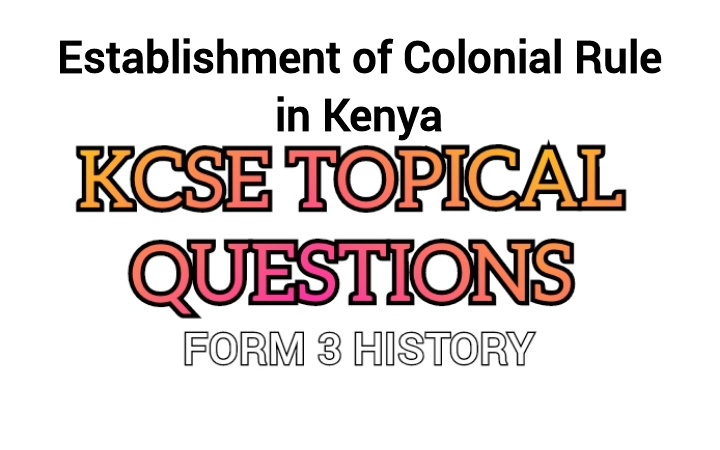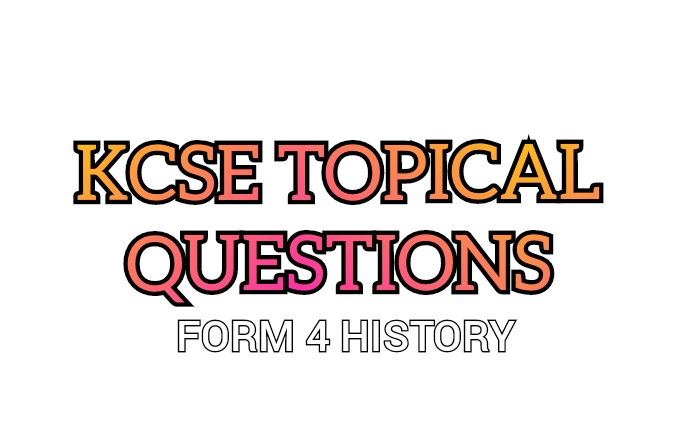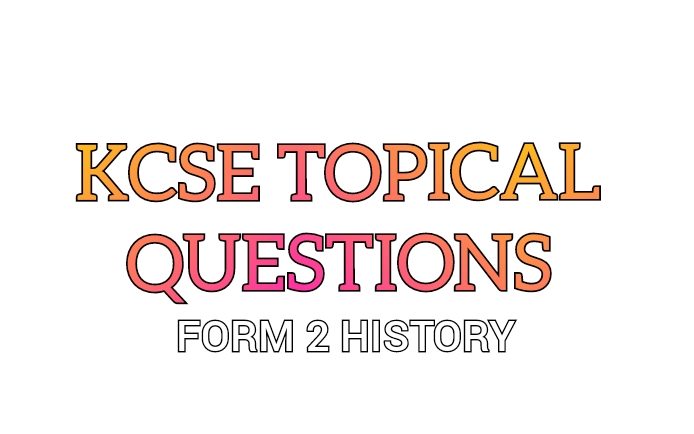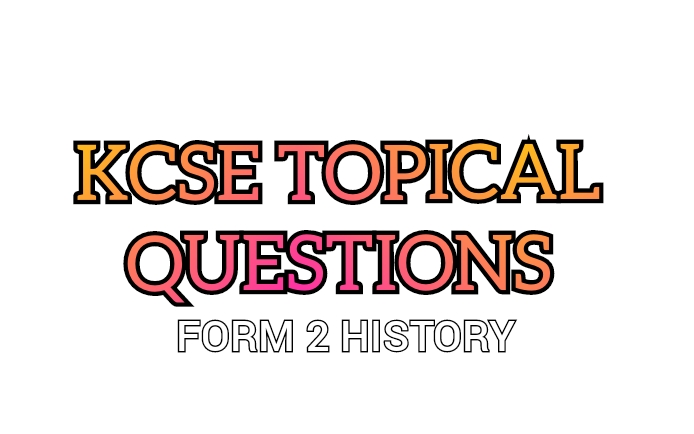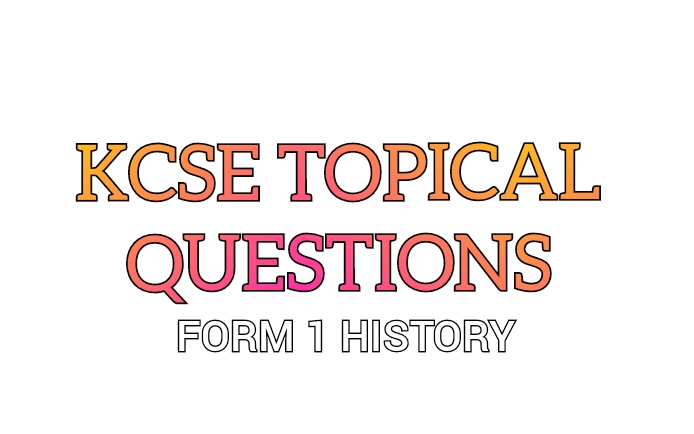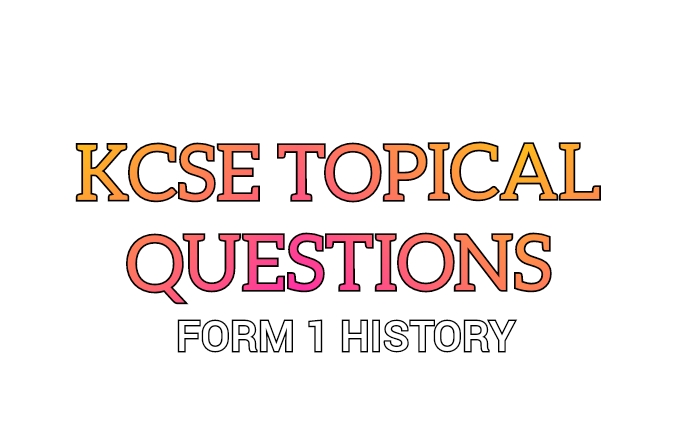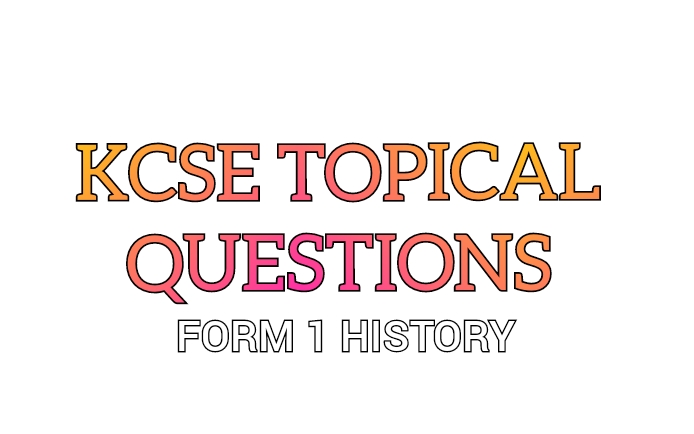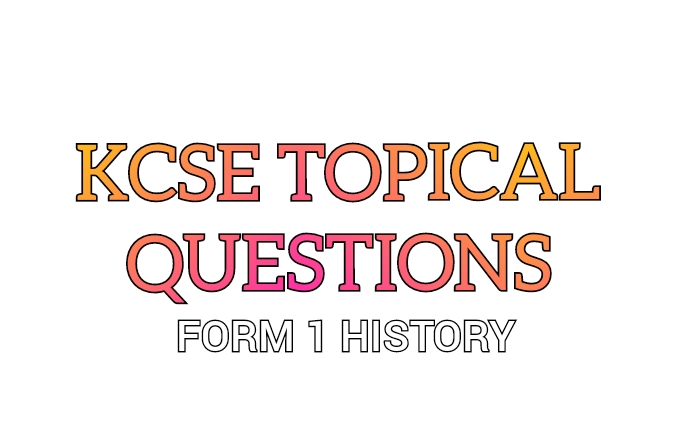Form 3 History Topical Questions : Colonial Administration In Africa
Colonial Administration In Africa Topical Questions
1) Mention the European colonial powers in Africa.
2) List four systems of colonial administration.
3) Identify the European powers that applied the policy of assimilation in administering their colonies.
4) State two systems of administration used by the British in administering their colonies.
5) Mention the system of administration used by the British where Africans had a centralized system of government.
6) Mention the system of administration used by the British where Africans had a decentralized system of government.
7) Mention the system of administration used by the British in Zimbabwe.
8) Mention the system of administration used by the Germans in their colonies.
9) Mention the system of administration used by the Dutch in Africa.
10) Mention the system of administration used by Italy in Africa.
11) Identify two countries in Africa where the British used both direct and indirect rule.
12) Identify one country in Africa where the British used direct rule.
13) State the characteristics of colonial administration.
14) Define indirect rule.
15) State two factors that influenced introduction of indirect rule in Africa instead of direct rule by the Britain.
16) Mention the African practices that had to be eliminated by the British because they were repugnant.
17) State the reasons why the British applied the policy of indirect rule in their colonies.
18) State the factors that made the British to use indirect rule in Kenya.
19) State the effects of indirect rule in Kenya.
20) State the responsibility that was given to the chiefs according to the Village Headman Act and Ordinance of 1902.
21) State the functions of the chiefs appointed by the British.
22) State the reasons why the chiefs were being rejected by Africans.
23) Discuss the factors that motivated Fredrick Lugard the British high commissioner to apply indirect rule in Northern Nigeria.
24)Highlight the duties of Emirs in Northern Nigeria.
25) Mention the reasons why Frederick Lugard found it difficult to impose indirect rule in Southern Nigeria.
26) State the demerits of indirect rule.
27) Discuss the effects of indirect rule on the African communities.
28) Define the term direct rule.
29) Identify the administration policy applied by Europeans in areas where traditional leaders were uncooperative to colonial authority in Africa.
30) Identify the three colonies that made up the British Central Africa.
31) State the characteristics of direct rule in Zimbabwe.
32)Name the leader of the British South African Company.
33) Mention the commercial company that colonized Zimbabwe.
34) State the reasons why the British resorted to use of direct rule in Zimbabwe.
35) When did Southern Rhodesia (Zimbabwe) become a crown colony?
36) Give the year that Zimbabwe gained independence.
37) Identify the racist policy that ran Southern Rhodesia.
38) State the characteristics of the two pyramid policy in Southern Rhodesia
39) State the two main pillars of two pyramids policy in Southern Rhodesia.
40) State the four areas of land as categorized in the Land Apportionment Act of 1930 in Southern Rhodesia.
41) State the consequences of Land Apportionment Act to the Africans in Southern Rhodesia.
42) State the main function of the Industrial Conciliation Act of 1934 in Southern Rhodesia.
43) Mention the terms of the Industrial Conciliation Act of 1934 in Southern Rhodesia.
44) Which African territory was referred to as Southern Rhodesia?
45) Which African territory was referred to as Northern Rhodesia?
46) Which African territory was referred to as Nyasaland?
47) List the territories that formed the Central African Federation in 1953
48)Name the first Prime Minister of Zimbabwe.
49) State the qualifications of an African voter in colonial Zimbabwe.
50) State the effects of British rule in Zimbabwe.
51) Identify the system of administration used by the British in Zimbabwe.
52) Give the year of the French revolution.
53) State the duties of the chiefs in Zimbabwe during the colonial rule.
54) Define assimilation policy.
55)Name the four communes in Senegal where the policy of assimilation was applied.
56) Mention three grades of local chiefs who ruled outside the communes in Senegal.
57) State the functions of Chefs de village in Senegal.
58) Give the functions of Chefs de Canton in Senegal.
59) State the features / aspects of assimilation in Senegal.
60) State the reasons why the French used the policy of assimilation in Senegal.
61)Highlight the requirement that Africans had to fulfill in order to be assimilated.
62) State the benefits which were enjoyed by the assimilated Africans in Senegal.
63) Give reasons why the policy of assimilation failed in Senegal.
64) State the negative consequences / effects of assimilation in Senegal.
65) State the positive consequences / effects of assimilation in Senegal.
66) Explain the policy of association.
67) State the differences between British and French administration policies.
68) State the similarities between British and French administrative policies.
69) Apart from Kenya name another country in Africa where indirect rule was practiced.
70)Name the political head of British administration in colonial Kenya.
71) Give the reason why legislative council was established in Kenya in 1907.
72) State one reason why the policy of association was preferred to the policy of assimilation.
 KCSE Revision Zone
KCSE Revision Zone


